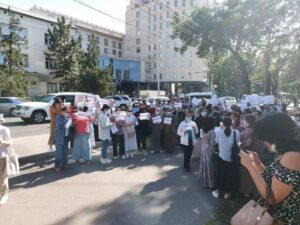Orhan İnandı, the founder and president of the Turkish-Kyrgyz Sapat school network operating in Kyrgyzstan, went missing in Bishkek on Monday and is feared to have been abducted by Turkey’s spy agency due to his alleged links to the Gülen movement, according to a statement from the school network.
Turkey claims the founder of the school network is Turkish-Islamic cleric Fethullah Gülen, whose movement is accused by the Turkish government of masterminding a failed coup in Turkey in July 2016. The movement strongly denies any involvement in the coup attempt.
İnandı left his house at around 8 p.m. on Monday for a meeting at a nearby café. He was last contacted by a friend at around 9 p.m. Attempts by his family to contact him all failed. İnandı’s Toyota Lexus was found parked in an area around eight kilometers from his house at around 3 a.m. on Tuesday. The car’s doors were open and its tires were flat. His family immediately notified the Kyrgyz police about the disappearance, demanding an urgent investigation into his whereabouts.

“His jacket and two phones were in the car. Although I don’t have any eyewitnesses, I suspect he was abducted and taken to Turkey, and I am concerned for his safety,” İnandı’s wife, Reyhan, said in a press statement on Tuesday.
The Sapat (formerly Sebat) network of educational institutions has been operating in Kyrgyzstan since 1992. The school network has been run by the Kyrgyz Republic since 2017. Sixteen high schools, one international university, one international school and three primary schools operate under the school network.
İnandı had been working in Kyrgyzstan since 1995 and had been the president of the schools since 2001. The statement from the Sapat schools said İnandı received the title of “Excellence in Education of the Kyrgyz Republic” in 2002 and was awarded the Honorary Diploma of the Kyrgyz Republic in 2003 and the Dank medal of the Kyrgyz Republic for his contribution to the improvement of the education system in the country.

Dozens of Kyrgyz students and their parents, meanwhile, gathered in front of the Turkish Embassy in Bishkek on Tuesday, carrying placards that read in Kyrgyz and Russian: “Where is Mr İnandı?” There were reports suggesting that İnandı was being held at the embassy building.
İnandı is also a citizen of the Kyrgyz Republic.
People close to the family said there was a private jet waiting at Manas International Airport in Bishkek that was not listed on scheduled flights, raising suspicions that the jet could be used to return the teacher to Turkey where he will possibly face prosecution.
In the meantime, President of Kyrgyzstan Sadyr Japarov ordered the State Committee for National Security and the Ministry of Internal Affairs to conduct an extensive search to locate the missing teacher, according to a statement on the presidency website on Tuesday.
Turkish President Recep Tayyip Erdoğan has cracked down hard on alleged Gülen supporters, arresting or dismissing more than 100,000 public servants and urging foreign governments to hand over suspects since the failed coup.
The İnandı incident follows the enforced disappearance of nearly 30 people with real or alleged links to the Gülen movement since the coup attempt.
Mostly recently, Turkey’s National Intelligence Organization (MİT) arrested and brought back to Turkey Selahattin Gülen, a teacher and a nephew of Islamic scholar Gülen living in Kenya.
Some of the enforced disappearance victims in Turkey have spoken out in court, after they were found in police custody, recounting the systematic and severe torture they were subjected to during their interrogation by government operatives, who, victims said, waited until their wounds had healed to hand them over to the police.
According to a recent report by Freedom House on global transnational repression Turkey has become number one among countries that have conducted renditions from host states since 2014. The Turkish government has pursued its perceived enemies in at least 30 different host countries spread across the Americas, Europe, the Middle East, Africa and Asia since July 2016.
“Ankara’s campaign has primarily targeted people affiliated with the movement of religious leader Fethullah Gülen, which the government blames for the coup attempt,” the report said.


